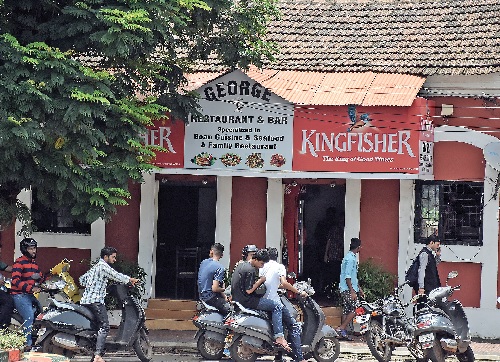Owners of around 13,000 bars and restaurants are looking at an uncertain future in the absence of a composition scheme, which reduces their tax burden, under the Goods-and-Services Tax regime, writes

A significant number of small bars and restaurants in the state will be adversely affected due to lack of composition scheme under the Goods-and-Services-Tax (GST) regime for such establishments, which are into serving liquor.
Michael Carrasco, president, All Goa Bars & Restaurants Owners Association, said, "There are 12,000 to 13,000 bars and restaurants in Goa. This includes all kinds of restaurants, including tavernas. Earlier, under value-added-tax (VAT), a composition scheme was applicable to all kinds of restaurants, whether they served alcohol or not. But, now under GST, there is no composition scheme for restaurants serving alcohol."
What exactly is a composition scheme? Such schemes are meant to bring small businesses within the tax net. These establishments have lesser turnover and owing to lack of
financial and other resources. they find it difficult to maintain detailed books of accounts.
To make them contribute something to the tax base of economy, government tells these businesses to pay a small portion of their revenue as tax. Since tax is levied on revenue, they only have to show proof of sales and not of inputs.
Sandip Bhandare, noted chartered accountant, said, "In GST regime, there is no composition scheme for a restaurant, if it serves alcohol. This is because alcohol is outside the purview of GST. Alcohol will come under VAT, while food and other beverages served by restaurants will come under GST."
There is a composition scheme under GST too under which restaurants with an annual turnover of less
than Rs 75 lakh can pay 5% of sales as tax. But, this scheme is not applicable, in case of a restaurant that serves
alcohol.
Carrasco continued, "There is 22% VAT on liquor in restaurants. Plus, there is 18% GST on food in a number of restaurants. Since restaurants serving liquor will not be able to benefit from a composition scheme, their tax burden will increase."
Due to lack of composition scheme, even small bars and restaurants will have to maintain detailed books of accounts and take the services of chartered accountants for the same.
This will add administrative burden on such establishments. Carrasco further said, "Apart from city areas like Panaji, Margao and the beach belt, most bars and restaurants in Goa are small and all of them will get affected because they can't benefit under the composition scheme."
As of now, bars and restaurants are still grappling with understanding the implications of GST from long-term perspective. Many of them are so small that they never had to speak to a tax professional earlier. Sources even revealed that these changes will make eating out more expensive.
Amey Naik, owner of Peep Kitchen in Caranzalem, said, "Now, even small bars and restaurants will have to maintain detailed books of accounts. Under composition scheme, you don't charge tax to your customers. The clientele at such restaurants is not used to seeing tax in their bills. Such a clientele will not like when they see tax in the bill in GST regime."
As of now, many small bars and restaurants provide manual bills to their customers. The law allows them to continue doing so even under GST. But tax returns have to be filed monthly under GST. This will make it necessary to have an automated billing system, which is linked to GST portal.
In a nutshell, all small bars and restaurants will have to move to electronic billing machines. Per se, it is not a bad idea, but it will add to their cost.
Small bars and restaurants are bracing themselves for tough times ahead in the GST regime. It remains to be seen what the state government can do to help them.
What is a composition scheme?
A composition scheme is aimed at bringing small businesses within the ambit of tax
Under this, government says that small establishments can pay a low rate of tax on sales
This means such businesses only have to show proof of sales and not of costs, as tax is not levied on profit
Under VAT, state government had a composition scheme, as per which, a tax rate of 10% of sales was charged for restaurants serving alcohol, provided annual turnover was not more than Rs 1 crore
The tax rate was 7% of annual sales for restaurants not serving alcohol. Provided annual turnover was not more than Rs 1 crore
Under GST, composition scheme is not applicable if a restaurant serves alcohol. This is because alcohol is not under the purview of GST
But under GST, for restaurants not serving alcohol, the composition scheme says that they can pay 5% of sales as tax, provided annual turnover is less than Rs 75 lakh